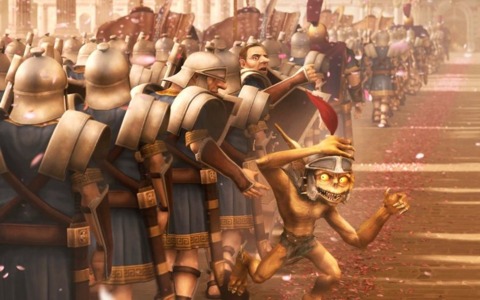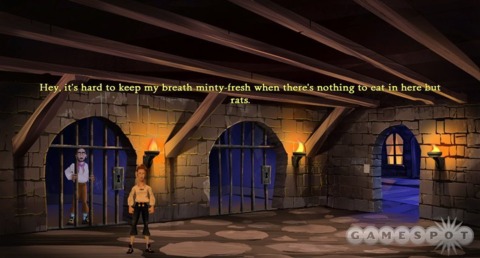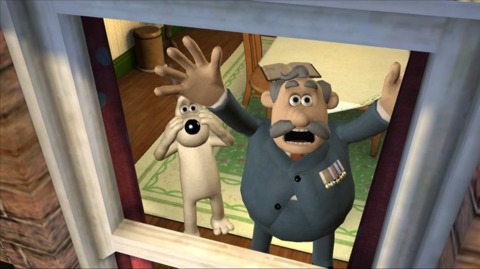Comedy in games no laughing matter
GDC 2010: Tim Schafer, Rhianna Pratchett, and Sean Vanaman trade tips that made Brutal Legend, Overlord, and Tales of Monkey Island humorous hits.
Who Was There: A panel of industry humorists including DoubleFine Productions founder Tim Schafer (Brutal Legend, Psychonauts), narrative designer and scriptwriter Rhianna Pratchett (Overlord, Heavenly Sword), Telltale Games writer/designer Sean Vanaman (Tales of Monkey Island, Wallace & Gromit's Grand Adventures) appeared, answering questions posed by A.V. Club writer John Teti.
What They Talked About: After a full Game Developers Conference week of serious, high-minded discussion about business models, social media, and emerging trends, it was finally time for a humor-in-games panel to lighten the mood.

Teti's first question to the panel was to ask why there isn't a genre in games simply known as "comedy." Pratchett said there shouldn't be. Comedy can be used across genres, she argued, and should be used to enrich gameplay of any sort.
Schafer said the games industry is incredibly imitative, so all it would take is one massively successful game known as a comedy title to spur publishing executives around the industry to churn out enough titles to support the genre tag. Vanaman said when developers set out to make a funny game, they actually have to start with a story that they weave comedy in and around. If developers think the point of their game is strictly to be funny, then it would come across as too forced.
Pratchett agreed, saying comedy games go bad when it's just about the writing. She said the comedy in great games starts with the gameplay. In Overlord, she said, the comedy stemmed in many places from players' treatment of the minions (as well as the amusing hats they could wear). In his own games, Vanaman said the actual mechanics of walking around and interacting with objects aren't inherently humorous, so the comedy stems from the script and characters, and heavily from the art.
Given the importance of timing in a good joke, Teti asked the panel how they handle being funny considering how much of the timing is interactive and in the hands of the players. Schafer said that with adventure games, it was like writing a play where the main character (the player, essentially) wanders around drunk onstage, improvising his actions throughout while the rest of the cast tries to work around him. Schafer said the key is for the developers to anticipate the player's actions as accurately as possible and design the game around that. He specifically mentioned a moment of perfect comedy in Metal Gear Solid 4 where a player can linger Snake's view on a female character. After a while (just long enough to make it obvious that the player is being kind of creepy, Schafer said), the woman asks what Snake is looking at.
Pratchett said that when making a game funny, it helps when the team is smaller and working together. With fewer people on the Overlord team, she said there was more trust among the developers, and she was able to go through with level designers on a day-to-day basis and ensure that each part of the game worked both for the gameplay and the humor.

Schafer said he wanted to create a safe atmosphere at DoubleFine to experiment and try stupid ideas. Reminiscing about his time on Monkey Island, Schafer said the best content and dialogue they came up with was when everyone was just goofing around. Once series creator Ron Gilbert made it clear that the lines they'd come up with weren't placeholder and were going in the finished product, Schafer joked that he never wrote another funny thing for the game.
He also pointed to a specific line in the game, "Look behind you! It's a three-headed monkey!" The line went over well when it was first proposed, but Schafer said he had plenty of second thoughts once the idea got to the stage where they were asking the art department to draw the monkey.
"That impulse, that fear of 'That's too ridiculous,' is the enemy," Schafer said.
Schafer noted that the standard for comedy in games isn't set. As a result, he said it's too easy for developers and game writers to become lazy about it and settle for substandard humor.
"So the key is to care that it's going to be funny?" Teti asked.
"Or be absolutely terrified that it's going to suck," Schafer responded.
Vanaman said he inspires his own writing by taking in episodes of 30 Rock and Arrested Development, or even watching YouTube play-throughs of games like Schafer's own The Secret of Monkey Island 2: LeChuck's Revenge.
Teti asked about how the panel doles out its jokes, whether they put the best stuff up front where everyone will see it, or whether they hide the gems away for completionists to discover.
"Well, they're all like my babies," Vanaman said. "So where do I hide my babies…"
Taking another, more serious crack at an answer, Vanaman said he writes the game linearly, so it just depends on what he's working on when inspiration strikes. He also talked briefly about exercising restraint when it comes to writing comedy in games.

"You don't want to be that guy," Vanaman said, "'I'm funny! I'm a wacky dude!' You don't want your game to be that guy. The game knowing it's funny is the hard part, and drama, if you sprinkle it in, will take the edge off that."
As for how developers can translate their own natural wit into their games, Vanaman said it was important to empower the development team to be funny, to let them try out bold, specific ideas for humor even if it looks a little odd on paper. Schafer said if developers weren't in a position to make such high-level decisions, they could always try to be sneaky and slip humor into the game wherever possible, whether they be programmers or sound designers.
Quote: "Clown suits. If everyone's wearing clown suits all day long, it's totally funny. All the time." --Schafer, on how he fosters a humor-friendly environment for the development team.
"Things that are funny? Don't use them as taunts in a boss fight. Nothing is funny 30 times in a row." --Schafer, offering a pearl of wisdom that he learned the hard way.
Takeaway: Making games funny is as difficult as making them fun.
Got a news tip or want to contact us directly? Email news@gamespot.com
Join the conversation